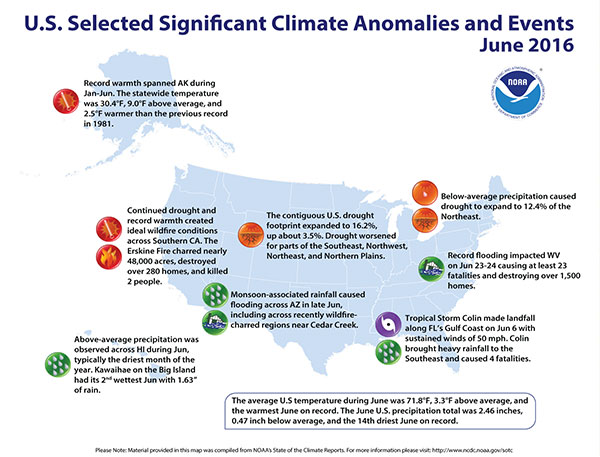Last month I wrote about May 2016 being the hottest ever May on record, and so we now have the data for June 2016 and guess what?
The average June temperature for the Lower 48 states was 71.8 degrees F, making it the warmest June on record, according to scientists from NOAA’s National Centers for Environmental Information. Above-average temperatures spanned the nation from coast to coast, and 17 states across the West, Great Plains and parts of the Southeast experienced temperatures much above average. June precipitation for the contiguous U.S. averaged 2.46 inches, 0.47 inch below average, ranking as the 14th driest on record.
What should be truly worrying is the current trend …
- Oct 2015 was the warmest Oct ever.
- Nov 2015 was the warmest Nov ever.
- Dec 2015 was the warmest Dec ever.
- Jan 2016 was the warmest Jan ever.
- Feb 2016 was the warmest Feb ever.
- Mar 2016 was the warmest March ever.
- April 2016 was the warmest April ever.
- May 2016 was the warmest May ever.
… and so it would appear that the new normal is one in which each and every month a climate record is breached.
So far only the US National data for June 2016 is available, and so we still await the June 2016 global data.
Over in the Arctic it is a similar story with sea ice loss. We have had one exception there so far, March 2016 was not a new low for sea ice loss in the arctic, only the 2nd lowest because March 2015 just beat it …
Arctic sea ice extent during June 2016 averaged 10.60 million square kilometers (4.09 million square miles), the lowest in the satellite record for the month. So far, March is the only month in 2016 that has not set a new record low for Arctic-wide sea ice extent (March 2016 was second lowest, just above 2015). June extent was 260,000 square kilometers (100,000 square miles) below the previous record set in 2010, and 1.36 million square kilometers (525,000 square miles) below the 1981 to 2010 long-term average.
There are still some who seriously doubt the reality of climate change, but that conversation is over, it ended over a decade ago. The evidence is overwhelming and abundantly clear. The conversation now revolves around what we need to do, what we can do, and what we should do, to address what will over time become the greatest challenge our species will ever encounter.
